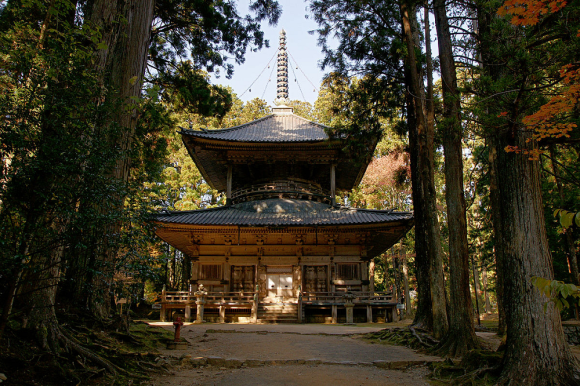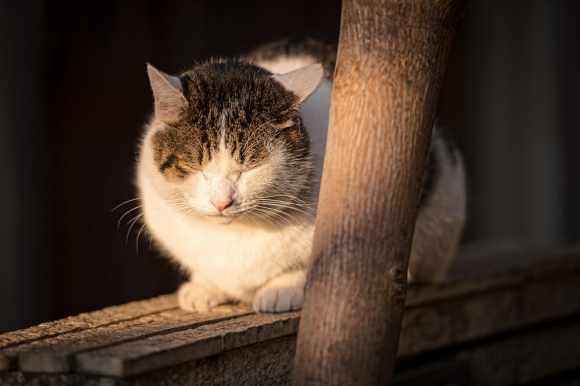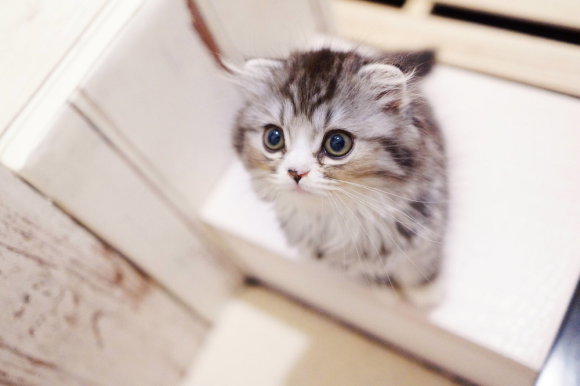
But some sources show the report is only half-right.
Wakayama Prefecture’s Koyasan, also known as Mount Koya, is a mountainous region that’s home to a number of temples that serve as the headquarters of the Shingon Buddhist sect. While some religious institutions in Japan are situated in city centers where they rub shoulders with the secular world, Koyasan’s remote location means it has traditionally had a strong connection with ascetic training, and to this day it attracts pilgrims and travelers who stay in temple lodgings and sample the monks’ lifestyle.
In the past, this focus on purifying the soul and focusing on enlightenment meant that women were previously barred from entering many parts of mountainous Koyasan. But a recent episode of broadcaster Nippon Television’s Sekai Ichi Uketai Jugyo variety program claims that not just human females, but cats (of either gender) were also previously banned from Koyasan.
Sekai Ichi Uketai Jugyo claimed the reason for this is that the overpowering cuteness of felines would be a hindrance to the monks’ training.
▼ Awww – I mean, away with you!
Japanese Internet users vigorously nodded their heads in understanding, before presumably going back to surreptitiously watching cute cat videos while they were supposed to be working. However, while it may be true that cats’ captivating cuteness curtails conscientious conduct of the industrious variety, the situation might not have been as simple as the monks in charge saying “Nope, sorry. Kitties are too adorable,” since cats don’t seem to have been the only animals mentioned in Koyasan regulations.
A 1906 writing from Shinjo Hinonishi, one of the primary administrators of Okunoin, Koyasan’s most prominent temple, stipulates that “monks shall not feed cats, nor birds.” Likewise, the Wakayama Tourism Federation, in its introduction to Koyasan, says that the keeping of pets in general was banned. Other historical documents mention similar restrictions, with the concern, when specified, being not that the animals were distractingly cute, but would sully the sacred grounds of the temples.
▼ Cute, but not quite religion-hinderingly cute
The specific mentions of cats and birds may have simply been made since those animals are among the two most likely to be enticed to take up residence in a location if humans regularly give them food. It’s also worth pointing out that while monks weren’t allowed to extend hospitality to the animals, it doesn’t look like they were rounding up the creatures and forcibly expelling them from the mountain range either.
However, there was apparently one exception to Koyasan’s “no pets” rule: dogs. According to legend, Kukai, the itinerant monk who founded Koyasan as a center of Buddhist worship, was guided to the area by a pair of dogs, and thus a privileged status, in which they could be kept as companions, was awarded to their canine kin.
And, to repeat, Koyasan’s anti-cat stance is now a thing of the past. So while felines may not enjoy the reverence at Koyasan that they do at some other temples in Japan, they’re no longer on the official list of undesirables.
Sources: Jin, J Town Net, A Netlore Chase
Top image: Wikipedia/663highland
Insert images: Pakutaso (1, 2)



 Buddhist priest at Japanese temple lodging goes viral for rude responses to tourist’s bad reviews
Buddhist priest at Japanese temple lodging goes viral for rude responses to tourist’s bad reviews Real Buddhist monk shows off hot (and sweet) EDM dance moves in Mount Koya video
Real Buddhist monk shows off hot (and sweet) EDM dance moves in Mount Koya video Step aside, Hachiko! Yamaguchi’s Cat Temple offers a samurai tale of feline fealty
Step aside, Hachiko! Yamaguchi’s Cat Temple offers a samurai tale of feline fealty Tokyo’s beckoning cat temple asks foreign tourists to stop writing on the beckoning cats they buy
Tokyo’s beckoning cat temple asks foreign tourists to stop writing on the beckoning cats they buy Cute cat infiltrates famous Japanese rock garden at Kyoto’s Tofukuji Temple 【Video】
Cute cat infiltrates famous Japanese rock garden at Kyoto’s Tofukuji Temple 【Video】 Japan manners debate: Is it OK to put a Mister Donut donut back on the shelf after taking it?
Japan manners debate: Is it OK to put a Mister Donut donut back on the shelf after taking it? Japan has omurice chocolate, and the weirdest thing isn’t how it tastes
Japan has omurice chocolate, and the weirdest thing isn’t how it tastes Swapping seats on Japan’s bullet trains is not allowed, Shinkansen operator says
Swapping seats on Japan’s bullet trains is not allowed, Shinkansen operator says Hunter x Hunter teams up with Shimamura clothing chain for clothing and more treasures galore
Hunter x Hunter teams up with Shimamura clothing chain for clothing and more treasures galore A look back on 40 years of Japanese schools banning stuff
A look back on 40 years of Japanese schools banning stuff 7-Eleven Japan sells freshly baked pizzas…but are they any good?
7-Eleven Japan sells freshly baked pizzas…but are they any good? Family Mart releases huge range of cute sweets for Cat Day in Japan
Family Mart releases huge range of cute sweets for Cat Day in Japan Yokohama restaurant serves fried axolotl, along with giant isopod, camel, and crocodile
Yokohama restaurant serves fried axolotl, along with giant isopod, camel, and crocodile Downloads of 39-year-old Guns N’ Roses song increase 12,166 percent thanks to Gundam
Downloads of 39-year-old Guns N’ Roses song increase 12,166 percent thanks to Gundam Japan has a new bar just for people thinking about quitting their jobs, and the drinks are free
Japan has a new bar just for people thinking about quitting their jobs, and the drinks are free Is China’s don’t-go-to-Japan warning affecting the lines at a popular Tokyo gyukatsu restaurant?
Is China’s don’t-go-to-Japan warning affecting the lines at a popular Tokyo gyukatsu restaurant? Three beautiful places to see Japan’s plum blossoms after starting your day in downtown Tokyo
Three beautiful places to see Japan’s plum blossoms after starting your day in downtown Tokyo Cherry blossom forecasts map shows Japan’s OTHER sakura season is starting right now
Cherry blossom forecasts map shows Japan’s OTHER sakura season is starting right now Huge Evangelion Unit-01 head appearing in lights in Japan to celebrate anime’s 30th anniversary
Huge Evangelion Unit-01 head appearing in lights in Japan to celebrate anime’s 30th anniversary Take a trip to Japan’s Dododo Land, the most irritating place on Earth
Take a trip to Japan’s Dododo Land, the most irritating place on Earth New Studio Ghibli stamps leave an impression on your stationery…and your heart
New Studio Ghibli stamps leave an impression on your stationery…and your heart Japan’s first all-matcha ramen restaurant is now open in Kyoto【Photos】
Japan’s first all-matcha ramen restaurant is now open in Kyoto【Photos】 Japan’s most famous Mt. Fuji view park cancels cherry blossom festival because of overtourism
Japan’s most famous Mt. Fuji view park cancels cherry blossom festival because of overtourism Starbucks Japan releases new drinkware and goods for Valentine’s Day
Starbucks Japan releases new drinkware and goods for Valentine’s Day Japan releases first official sakura cherry blossom forecast for 2026
Japan releases first official sakura cherry blossom forecast for 2026 Archfiend Hello Kitty appears as Sanrio launches new team-up with Yu-Gi-Oh【Pics】
Archfiend Hello Kitty appears as Sanrio launches new team-up with Yu-Gi-Oh【Pics】 China’s don’t-go-to-Japan warning looks to be affecting tourist crowds on Miyajima
China’s don’t-go-to-Japan warning looks to be affecting tourist crowds on Miyajima Starbucks Japan releases new Frappuccino and latte for Valentine’s Day
Starbucks Japan releases new Frappuccino and latte for Valentine’s Day Studio Ghibli releases new “komorebi” plush toys from Princess Mononoke and Spirited Away
Studio Ghibli releases new “komorebi” plush toys from Princess Mononoke and Spirited Away Yokai are descending upon Tokyo this spring in the latest immersive art experience
Yokai are descending upon Tokyo this spring in the latest immersive art experience Japan’s Naruto theme park now offering real-world version of Minato’s kunai ninja weapon
Japan’s Naruto theme park now offering real-world version of Minato’s kunai ninja weapon Our 52-year-old pole dancing reporter shares his tips for achieving your New Year’s exercise goal
Our 52-year-old pole dancing reporter shares his tips for achieving your New Year’s exercise goal Survey asks foreign tourists what bothered them in Japan, more than half gave same answer
Survey asks foreign tourists what bothered them in Japan, more than half gave same answer Japan’s human washing machines will go on sale to general public, demos to be held in Tokyo
Japan’s human washing machines will go on sale to general public, demos to be held in Tokyo We deeply regret going into this tunnel on our walk in the mountains of Japan
We deeply regret going into this tunnel on our walk in the mountains of Japan Studio Ghibli releases Kodama forest spirits from Princess Mononoke to light up your home
Studio Ghibli releases Kodama forest spirits from Princess Mononoke to light up your home Major Japanese hotel chain says reservations via overseas booking sites may not be valid
Major Japanese hotel chain says reservations via overseas booking sites may not be valid Put sesame oil in your coffee? Japanese maker says it’s the best way to start your day【Taste test】
Put sesame oil in your coffee? Japanese maker says it’s the best way to start your day【Taste test】 No more using real katana for tourism activities, Japan’s National Police Agency says
No more using real katana for tourism activities, Japan’s National Police Agency says Starbucks Japan reveals new sakura drinkware collection, inspired by evening cherry blossoms
Starbucks Japan reveals new sakura drinkware collection, inspired by evening cherry blossoms Updated cherry blossom forecast shows extra-long sakura season for Japan this year
Updated cherry blossom forecast shows extra-long sakura season for Japan this year A visit to Tokyo’s luckiest, kitty-est lucky cat temple: Gotokuji【Photos】
A visit to Tokyo’s luckiest, kitty-est lucky cat temple: Gotokuji【Photos】
Leave a Reply